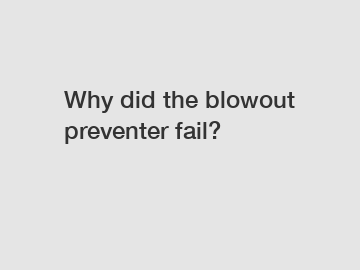Why did the blowout preventer fail?
The blowout preventer (BOP) is a critical piece of equipment used in oil drilling operations to prevent uncontrolled releases of oil and gas from the well. However, in the Deepwater Horizon oil spill in 2010, the blowout preventer failed to function as intended, leading to one of the largest environmental disasters in history. This failure raised questions about why the blowout preventer failed and what could have been done to prevent it. In this article, we will explore some of the reasons why the blowout preventer failed in the Deepwater Horizon disaster.
**Mechanical Failure**.
One of the primary reasons why the blowout preventer failed on the Deepwater Horizon rig was due to mechanical failure. The blowout preventer is a complex piece of equipment that is designed to seal the wellbore in the event of a blowout, but in this case, the shear rams, which are supposed to cut and seal the drill pipe, did not fully engage. This failure was a result of poor maintenance and inadequate testing of the blowout preventer, as well as design flaws that made it difficult to operate effectively under the extreme pressures and temperatures of the deep-sea environment.

**Human Error**.
Another factor that contributed to the failure of the blowout preventer was human error. In the days leading up to the blowout, there were several warning signs that the well was in danger of a blowout, but these signs were ignored or misunderstood by the crew on the rig. Additionally, when the blowout occurred, the crew made several critical mistakes in their attempts to control it, including activating the blowout preventer in the wrong sequence and failing to recognize that it was not sealing the well properly. These errors ultimately led to the failure of the blowout preventer and the subsequent explosion and oil spill.
**Lack of Regulation**.
A key reason why the blowout preventer failed on the Deepwater Horizon rig was due to a lack of adequate regulation and oversight of the oil drilling industry. In the years leading up to the disaster, the oil industry had successfully lobbied to weaken regulations and oversight of offshore drilling operations, including the blowout preventer. This lack of regulation allowed companies like BP to cut corners on safety and maintenance in order to save time and money, ultimately leading to the failure of the blowout preventer and the disaster that followed.
**Conclusion**.
In conclusion, the failure of the blowout preventer on the Deepwater Horizon rig was a result of multiple factors, including mechanical failure, human error, and a lack of regulation. This disaster serves as a stark reminder of the importance of proper maintenance, training, and oversight in the oil drilling industry to prevent future accidents and protect the environment. Moving forward, it is essential that companies in the oil industry prioritize safety and invest in the latest technology to ensure that blowout preventers function as intended in the event of a blowout.
For more information on blowout preventers and oil drilling safety, please contact us.
For more types of blowout preventer, bop sizes, china bop manufacturerinformation, please contact us. We will provide professional answers.

Comments
0